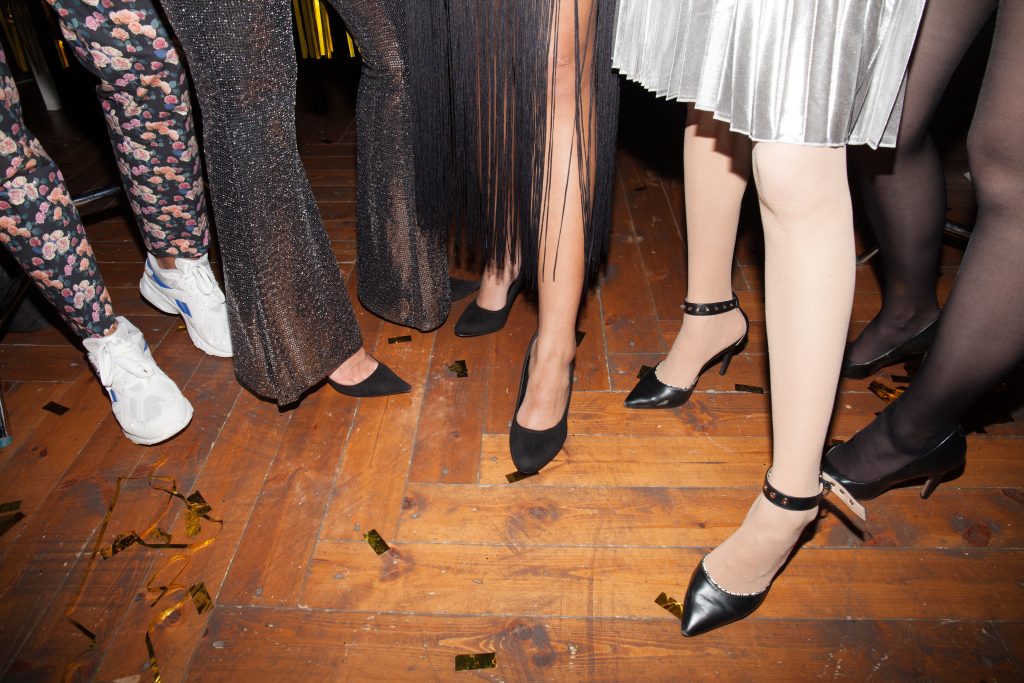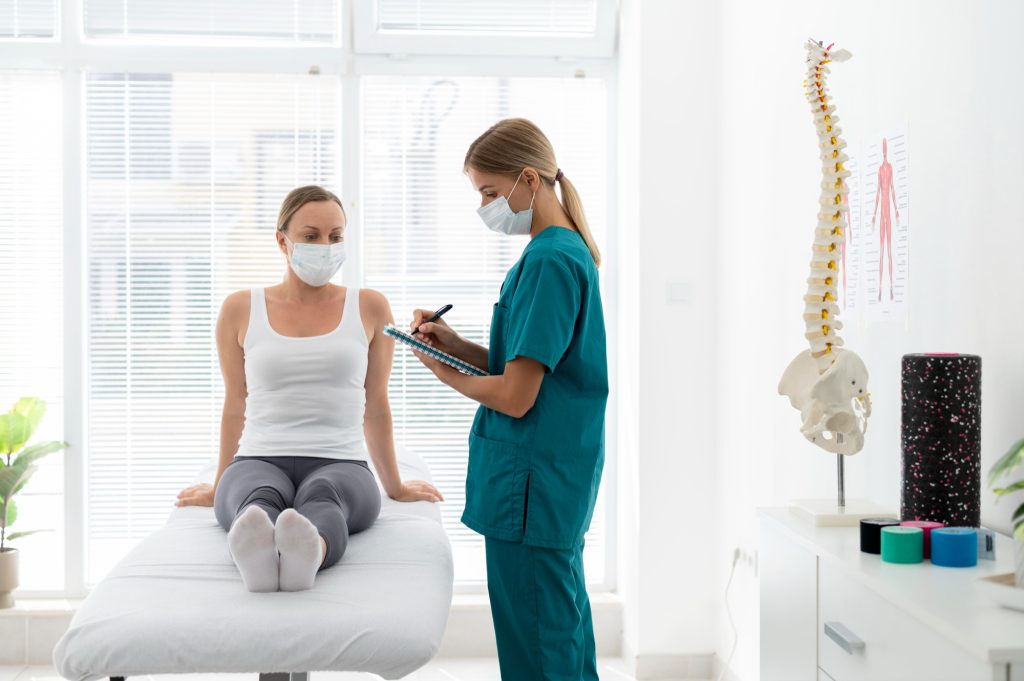Discover the impact of wearing heels or flat shoes on postpartum back pain.
Can Wearing Heels or Flat Shoes Exacerbate Postpartum Back Pain?

Women who have recently given birth often experience a wide range of physical challenges, from hormonal changes to sleepless nights. One of the common postpartum issues that many new mothers face is back pain. While back pain can be caused by various factors, have you ever wondered if your choice of footwear could worsen this discomfort? In this article, we will explore the connection between wearing heels or flat shoes and exacerbating postpartum back pain.
Understanding Postpartum Back Pain
Before diving into the impact of footwear on postpartum back pain, let’s first understand what causes this discomfort. It’s no secret that pregnancy takes a toll on a woman’s body, and the back is no exception. During pregnancy, the body undergoes significant changes, including weight gain, loosening of ligaments, and changes in posture. These changes can put strain on the back muscles, leading to pain and discomfort after giving birth.
Now, let’s take a closer look at the causes and duration of postpartum back pain.
Causes of Postpartum Back Pain
There are several factors that contribute to postpartum back pain. Firstly, during pregnancy, the growing baby puts extra pressure on the spine and surrounding muscles. This increased weight can lead to muscle imbalances and strain on the back. Additionally, hormone levels fluctuate during pregnancy and after childbirth, which can affect the strength and stability of the ligaments supporting the back. The hormonal changes can also lead to joint laxity, making the back more susceptible to injury and pain.
Furthermore, the physical act of giving birth, whether vaginally or via cesarean section, can strain the back muscles and result in temporary pain. The intense contractions and pushing during labor can cause muscle fatigue and soreness in the back. In the case of a cesarean section, the surgical incision and the subsequent healing process can also contribute to back pain.
It’s important to note that every woman’s experience with postpartum back pain is unique. While some may only experience mild discomfort for a short period, others may endure more severe pain for an extended duration. Factors such as pre-existing back conditions, the type of delivery, and individual healing processes can all influence the severity and duration of postpartum back pain.
Duration of Postpartum Back Pain
The duration of postpartum back pain can vary from woman to woman. For some, the pain may resolve within a few weeks or months after giving birth. This is often the case for those who experience mild discomfort and have no underlying back conditions.
However, for others, postpartum back pain may persist for a longer period. This can be due to various factors, including the severity of the pain, the presence of pre-existing back conditions, and the overall healing process. It’s important for women experiencing prolonged back pain to seek medical advice and treatment to ensure proper management and relief.
Additionally, it’s worth mentioning that postpartum back pain can have an impact on a woman’s daily activities and overall well-being. The discomfort and limitations caused by back pain can make it challenging to care for a newborn, engage in physical activities, and even affect mental health. Therefore, seeking appropriate support and treatment is crucial for a smoother postpartum recovery.
In conclusion, postpartum back pain is a common issue that many women experience after giving birth. Understanding the causes and duration of this discomfort can help women navigate their recovery journey more effectively. Whether it’s through proper footwear, exercises, or medical interventions, addressing postpartum back pain is essential for a healthier and more comfortable postpartum experience.
The Impact of Footwear on Back Health
Now that we have a better understanding of postpartum back pain, let’s explore how our choice of footwear can influence our back health. It’s time to delve into the anatomy of heels and flat shoes.
The Anatomy of Heels and Flat Shoes
Heels, those elegant but sometimes towering works of art, can dramatically change the alignment of the body. As the heel height increases, the weight distribution shifts forward, causing the lower back to arch excessively. This arching puts additional strain on the muscles and ligaments of the lower back, potentially leading to discomfort and pain.
On the other hand, flat shoes offer minimal arch support, leading to a flatter foot position and potentially altering the natural curvature of the spine. Without proper support, the arches of the feet may collapse, causing the feet to roll inward. This inward rolling, known as overpronation, can also contribute to postpartum back pain by disrupting the body’s natural alignment.
Our feet play a vital role in maintaining proper posture, so it’s essential to understand how footwear can affect our overall body alignment.
How Footwear Can Affect Your Posture
Good posture is not just about standing or sitting up straight; it’s about maintaining the body’s natural alignment. Wearing heels pushes the pelvis forward and increases the lumbar curve, while flat shoes may cause the pelvis to tilt backward and decrease the curvature. Both excessive arching and flattening can strain the back muscles and potentially contribute to postpartum back pain.
When wearing heels, the body’s center of gravity shifts forward, causing the muscles in the lower back to work harder to maintain balance. This increased workload can lead to muscle fatigue and discomfort. Additionally, the exaggerated arching of the lower back can compress the spinal discs, potentially leading to herniation or other spinal issues.
On the other hand, flat shoes can also have detrimental effects on posture. Without proper arch support, the feet may roll inward, causing the knees to collapse inward as well. This misalignment can put additional stress on the hips and lower back, leading to pain and discomfort.
It’s clear that our choice of footwear can have a significant impact on our posture, but what does this mean for postpartum back pain specifically? Let’s explore the effects of heels and flat shoes separately.
The Connection Between Heels, Flat Shoes, and Postpartum Back Pain
The Effect of Heels on Postpartum Back Pain
As tempting as it may be to slip into those killer heels for a special occasion, it’s essential to be aware of the potential consequences. Wearing heels can exacerbate postpartum back pain by further straining the already weakened back muscles. The excessive arching of the lower back puts additional pressure on the spine, leading to increased discomfort.
During the postpartum period, the body undergoes significant changes, including hormonal fluctuations and physical adjustments. These changes can affect the stability and strength of the core muscles, including those in the back. Therefore, it becomes even more crucial to prioritize your back health and make informed choices about footwear.
While heels may make you feel like you’re walking on air, it’s crucial to consider the long-term impact on your back. The elevated heel height shifts the body’s center of gravity forward, causing the lower back to compensate by arching excessively. This unnatural posture not only strains the back muscles but can also lead to imbalances in other areas of the body, such as the hips and knees.
When selecting footwear during the postpartum period, opt for more supportive and comfortable options. Look for shoes with a lower heel height or even consider flats that provide adequate cushioning and arch support. By choosing footwear that promotes proper alignment and reduces strain on the back, you can help alleviate postpartum back pain and support your body’s recovery process.
The Effect of Flat Shoes on Postpartum Back Pain
On the flip side, flat shoes may seem like the more practical choice for new mothers. However, it’s essential to find the right balance between comfort and support. Flat shoes that lack sufficient cushioning and arch support can contribute to poor posture and strain on the back muscles.
During the postpartum phase, the body is still recovering from the physical demands of pregnancy and childbirth. The ligaments and joints are more relaxed, making them susceptible to misalignment and injury. Wearing flat shoes without proper support can exacerbate these issues, leading to increased back pain and discomfort.
It’s not about completely abandoning flats; it’s about finding options that provide the necessary support and promote proper alignment, especially during the postpartum phase when the body is still recovering. Look for flats with cushioned insoles and arch support to help distribute weight evenly and reduce strain on the back.
Additionally, consider incorporating exercises and stretches into your daily routine to strengthen the back muscles and improve overall posture. Gentle yoga poses and core-strengthening exercises can be particularly beneficial for postpartum women, helping to alleviate back pain and promote a healthy recovery.
Remember, every woman’s postpartum journey is unique, and it’s essential to listen to your body’s needs. If you experience persistent or severe back pain, consult with a healthcare professional who can provide personalized advice and guidance tailored to your specific situation.
Prevention and Management of Postpartum Back Pain
Choosing the Right Footwear After Pregnancy
Now that we understand the impact of footwear on postpartum back pain, it’s time to discuss prevention and management strategies. When selecting footwear after pregnancy, prioritize comfort, support, and stability. Look for shoes with cushioned soles, arch support, and a comfortable heel height that doesn’t put excessive strain on your back.
Remember, your feet are the foundation of your body, so invest in shoes that prioritize your overall well-being.
Other Non-Invasive Methods for Back Pain Relief
In addition to choosing the right footwear, there are other non-invasive methods you can incorporate into your routine to relieve postpartum back pain. These include gentle exercises to strengthen your core and back muscles, practicing good posture throughout the day, and applying heat or cold therapy to alleviate discomfort.
It’s important to consult with your healthcare provider or a physical therapist before starting any exercise or treatment regimen to ensure you’re choosing safe and effective methods for your specific situation.
When to Seek Medical Help

Recognizing Severe Back Pain Symptoms
While most postpartum back pain resolves on its own with proper care and time, it’s essential to be aware of the signs that may indicate a more severe issue. Seek medical help if you experience persistent and intense back pain, numbness or weakness in your legs, bowel or bladder dysfunction, or if the pain spreads beyond your back to other parts of your body.
Your healthcare professional will be able to assess your condition thoroughly and provide appropriate guidance and treatment options to address your specific needs.
The Role of a Healthcare Professional in Managing Postpartum Back Pain
Your healthcare professional plays a crucial role in helping you manage and find relief from postpartum back pain. They can provide personalized advice, recommend further diagnostic tests or imaging if necessary, and guide you through appropriate treatment options, such as physical therapy, medication, or other interventions.
Remember, you don’t have to face postpartum back pain alone. Reach out to your healthcare professional for support and guidance on your journey to recovery.
In conclusion, the choice of footwear is indeed a factor to consider when dealing with postpartum back pain. While wearing heels or flat shoes may exacerbate discomfort, it’s essential to choose supportive options that promote good posture and minimize strain on the back muscles. Remember, every woman’s experience with postpartum back pain is unique, so listen to your body and prioritize your well-being. With the right footwear and a comprehensive approach to self-care, you can minimize postpartum back pain and focus on enjoying the precious moments with your little one.



